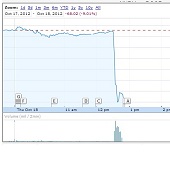Google’s latest earnings report woes to have an impact on the future of PPC?

In case you hadn’t heard the big news, Google’s latest earnings report was accidentally released 4 hours early when RR Donnelly (the firm who prints Google’s financial documents) filed the reports during trading hours by mistake.
The big news is that almighty Google’s net profits fell 20% from last year to $2.18 billion. Investors reacted badly to the news and $22 billion was wiped off Google’s total market value overnight with shares plunging 8% – so bad that trading had to be stopped just 20 minutes later.
Is Google’s future still secure?
Well the first thing to remember is that Google is still insanely profitable and isn’t going anywhere any time soon – their overall revenue grew 45% to $14.1 billion. This $2.18 billion is also still an enormous profit, particularly if you compare it to Bing’s operating loss of $1.45 billion for last year. Google’s main internet business (search engine revenue) rose 17% last year, the first time it had ever been below 20%, but still very healthy and an indication more that the market is beginning to become saturated than of things getting worse.
When you factor in the costs associated with Google’s $13 billion purchase of Motorola Mobility, a move designed more at protecting patents in the long term against Apple and the like, it seems less worrisome to us in PPC. The report showed Google’s Motorola division had made a $527 million operating loss on $2.58 billion of revenue. The nature of this particular earnings report release also added to the hysteria with many investors panic selling Google shares.
However, there were some signs of trouble looming on the horizon that might shake up PPC. First, Google announced that average click prices fell 15 per cent for paid search in the past year – good news for advertisers, not so good for Google and investors. This news was enough to send Yahoo and Facebook’s share prices down too.
The main reason for this fall in average cost per click stems from the accelerating switch of many users from desktop to mobile – an environment with generally cheaper click prices. Google’s mobile business is now generating revenue at roughly $8 billion per year, up from $2.5 billion last year.
So what does all this mean to us in PPC?
Expect to see Google start to push mobile advertising much more heavily in the coming year. The more advertisers on board with mobile, the higher those CPCs will rise and the more Google can mitigate the shift away from Desktop. They’re also going to start being even more aggressive with valuing mobile optimized sites to make sure their users are getting a quality experience from mobile PPC – get building if you haven’t already started.
Second, expect for cross-channel attribution modeling to become much more important to Google. The biggest issue with mobile for many of us is that it simply isn’t as valuable. PPC is a science and we won’t just up bids for the sake of it if they don’t offer a return on investment. What Google really needs is to be able to tell us click A from mobile led to a user researching and then heading upstairs and buying on their desktop at a later time. Without this data the murky world of direct vs. organic vs. paid search attribution will just get even harder to understand.
Finally look for Google to become more creative with new ideas and beta testing – particularly on mobile. Anything they can do to increase CTRs on mobile ads will be hugely important in their next earnings report. I’m expecting them to shift towards an increased number of ads on mobile search results too, particularly on high-end devices. My Samsung Galaxy S II can happily show me more than two PPC ads without cluttering the screen so I’m sure Google will start to push even more.
As always let us know your thoughts on Google’s earning report and what impact you think it will have on PPC in the future in the comments below.





